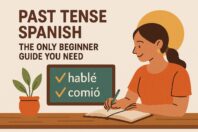Future Perfect Tense Spanish: Simplified For Beginners

Get our free email course, Shortcut to Conversational.
Have conversations faster, understand people when they speak fast, and other tested tips to learn faster.
More infoAlthough future perfect tense Spanish is probably the least common way to speak about the future, it is useful when used in a specific context.
The main use for this tense happens when speaking about an action that will be finished at a particular point in the future, or when talking about an action that could have happened, but we’re not certain if it actually did happen.
Before we continue, let’s back up a little and re-examine what we mean by “perfect” tense Spanish.
There are a total of five “perfect” tenses in Spanish, and all five are formed using a similar formula.
Each perfect tense use the auxiliary verb Haber + the main action verb in past participle.
Let’s refresh your mind with some examples:
1) Present Perfect
- I have eaten pasta at lunch – Yo he comido pasta en el almuerzo
2) Past Perfect (Pluperfect)
- I had talked to my boss about the increase – Yo había hablado con mi jefe sobre el aumento
3) Past Perfect Subjunctive
- I would have gone with you, but I was busy – Yo hubiese ido contigo, pero estaba ocupado
4) Present Perfect Subjunctive
- When I have finished the homework, I could go out- Cuando haya terminado la tarea, podré salir
5) Future perfect
- We will have bought a new house by the end of the year – Habremos comprado una casa nueva para finales de año
Before going further, If you are not familiar with the perfect structure and how to form the past participle, then make sure to read this post.
Future Perfect Tense Spanish: How To Conjugate Haber
As mentioned above, the verb Haber is an auxiliary verb that is used in each perfect tense – the only thing about this verb that changes in each tense is how it’s conjugated.
For the future perfect tense, we must conjugate Haber in the simple future tense:
| Personal pronoun | Haber (Future) | English equivalent |
| Yo | Habré | I will have |
| Tú | Habrás | You will have |
| Él / Ella | Habrá | He/She will have |
| Usted | Habrá | You (formal) will have |
| Nosotros | Habremos | We will have |
| Ustedes | Habrán | You will have |
| Ellos / Ellas | Habrán | The will have |
Now that you know how Haber is conjugated in the simple future tense, we can revisit to the formula we mentioned earlier.
To conjugate in the future perfect tense, you should use:
Personal pronoun + Haber conjugated in future tense + past participle + complement
Now let’s review some examples of this tense in action.
- I will have traveled at the end of the month – Yo habré viajado a fin de mes
- You will have traveled a lot the last year, but you didn’t learn a thing – Tú habrás viajado mucho el último año, pero no aprendiste nada
- He will have traveled in two days- Él habrá viajado en dos días
- We will have already traveled by the end of the week – Nosotros ya habremos viajado para el fin de semana
When To Use Future Perfect Tense Spanish?
The future perfect tense has a very specific use, as it’s used for future actions that haven’t happened yet, but we assume they will happen.
To elaborate, this tense is mainly used when talking about:
- Actions that will be finished at a particular point in the future.
- Actions that could have happened, but it’s not certain that it actually did happen
Let’s take the first point.
In other words, we use this tense for an action that will have been completed before another action takes place in the future.
- I will have finished the homework, by the time my mom arrives – Yo habré terminado la tarea para cuando llegue mi mamá
If there is no time reference or deadline in what you are saying, then you should use the simple future tense
- I will do the homework – Yo haré la tarea
You can think about future perfect tense Spanish as a way to indicate a deadline – be it a specific time, a or someday in future. But we must specify, when, in the future, that action will be completed.
Let’s take a look at more examples:
- I will have finished university, before Christmas – Yo habré terminado la universidad, antes de navidad
- We will have seen the movie before going to the forum – Habremos visto la película antes de ir al foro
- By this time tomorrow, I will have finished the project – Mañana a esta hora, habré terminado el proyecto
- You will have received a hotel survey before checking out – Usted habrá recibido antes de su check out una encuesta sobre el hotel
Future Perfect Tense Spanish + Present Subjunctive
We should also mention that future perfect tense Spanish is also commonly combined with the subjunctive to talk about an action that is not necessarily a fact, or actions that have not happened yet.
As you may already know, the subjunctive mood is used to talk about desire, possibility or probability that something will happen, and is the case, is the only time that you can use future perfect tense without mentioning a specific time in the future.
- I will have walked with the dog by the time you arrive – Ya habré caminado con el perro para cuando llegues
- Maybe they will have ordered the food by the time we get there – Tal vez ellos habrán pedido la comida para cuando lleguemos
- When mom wakes up, we will have done breakfast – Cuando mamá despierte, ya habremos hecho el desayuno
Questions Using Future Perfect Tense Spanish
Another common use of future perfect tense Spanish is simply when you want to ask questions about an action being competed in the future.
The formula is straightforward: ¿Haber (conjugated in future tense) + Past participle + Complement?
Some examples:
- Will you have eaten breakfast already when the bus arrive? – ¿Habrás desayunado cuando llegue el autobús?
- I do not see anyone, will the party be over? – No veo a nadie, ¿Habrá terminado la fiesta?
- Will he have called his parents to ask for permission? – ¿Habrá llamado a sus padres para pedir permiso?
Talk about likelihood, conjecture or ask rhetorical questions
Finally, you’ll find that future perfect tense Spanish is used when talking about likelihood, conjecture or asking rhetorical questions.
To formulate a hypothesis about a past action where we don’t have all of the information
- What happened to him? I don’t know, Maybe he will have fallen asleep – ¿Qué le pasó? No lo sé, tal vez se habrá quedado dormido
To express an assumption about, or for those questions we ask, which will not necessarily require an answer.
- I called her and she did not answer. What will have happened to her? – La llamé y no respondió. ¿Qué habrá pasado con ella?
Combine present perfect and future perfect
- She has been very upset all day. What will the boss have said to her? – Ella ha estado muy molesta hoy. ¿Qué le habrá dicho el jefe?
- They have been talking for hours. What happened? – Ellos han estado hablando por horas ¿Qué habrá sucedido?
Look at this general examples.
- The boy had a cast on his leg. Do you think he will have fallen off the bicycle? – El niño tenía un yeso en la pierna. ¿Crees que se habrá caído de la bicicleta?
- Maybe they will have already left painting classes – Tal vez ya habrán salido de las clases de pintura
- I imagine that we will have cashed out, our paycheck for Thursday – Me imagino que habremos cobrado nuestro cheque para el jueves
- I guess the teacher will have said that as a joke – Supongo que el profesor habrá dicho eso en broma
- Do you think we will have been wrong in the answers of this test? – ¿Crees que nos habremos equivocado en las respuestas de este exámen?
- They did not eat breakfast, they will have been hungry all day – Ellos no desayunaron, habrán tenido hambre todo el día
Future Perfect Tense Spanish: Exercises
1) Fill the blank space with the right conjugation of the verb HABER
- Él _____ pagado todas las deudas para fin de mes
- Nosotros _____ terminado de hacer la cena para cuando llegues a casa
- Su celular está apagado, tal vez _____ entrado al avión
- Yo _____ llamado a los clientes antes, para que sepan que iremos a verlos.
2) Choose correct or incorrect. Correct if necessary
- Mis amigos no llegan, ¿Se habrán perdido?
- Mi mamá y mi tía no están en la casa, hemos salir a tomar café
- El viernes habremos recibiremos los boletos de avión
- Yo creo que ellos habrán llegado a casa ya
3) Conjugate the verbs in parentheses in future perfect
- ¿Quién (haber/dejar) ___________ la puerta abierta?
- No encuentro las llaves, las (haber / perder ) ___________
- ¿A dónde (haber / ir) ___________ el gato?
- Hay muchos policías aquí ¿Qué (haber / pasar) ___________ ?
Future Perfect Tense Spanish: Answers
1) Fill the blank space with the right conjugation of the verb HABER
- Él habrá pagado todas las deudas para fin de mes
- Nosotros habremos terminado de hacer la cena para cuando llegues a casa
- Su celular está apagado, tal vez habrá entrado al avión
- Yo habré llamado a los clientes antes, para que sepan que iremos a verlos.
2) Choose correct or incorrect. Correct if necessary
- Mis amigos no llegan, ¿Se habrán perdido?
- Mi mamá y mi tía no están en la casa, habrán salido a tomar café
- El viernes habremos recibido los boletos de avión
- Yo creo que ellos habrán llegado a casa ya
3) Conjugate the verbs in parentheses in future perfect
- ¿Quién habrá dejado la puerta abierta?
- No encuentro las llaves, las habré perdido
- ¿A dónde habrá ido el gato?
- Hay muchos policías aquí ¿Qué habrá pasado?



